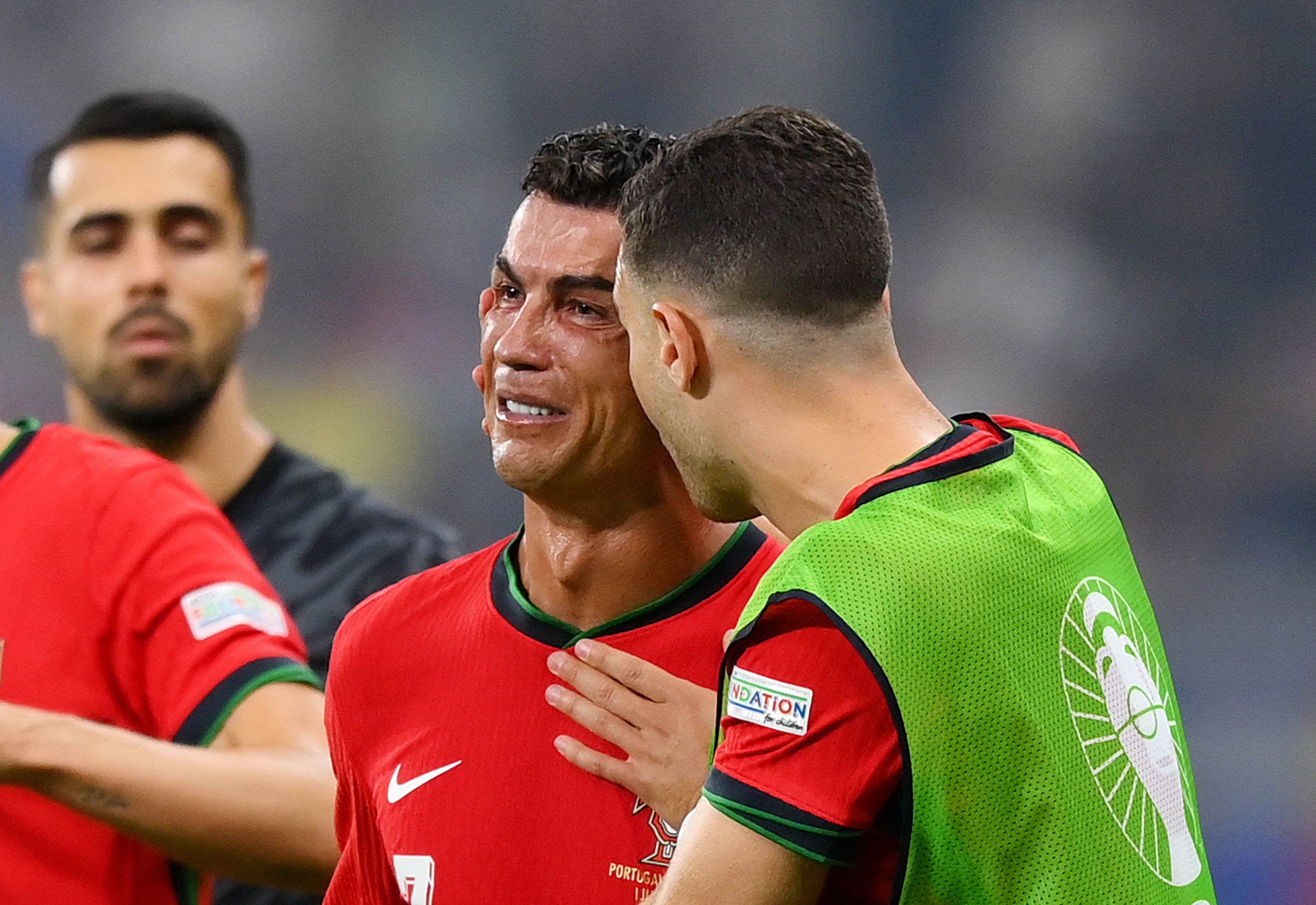My grandfather invented the penalty kick – but it was FIFA who weaponised it
As Cristiano Ronaldo feels the full tension of the knockout moment every football fan dreads , Robert McCrum, the grandson of the inventor of the penalty kick, reflects on its origins and how it was turned into the beautiful game’s ‘high noon’


Here begins the end of England’s daydream that “football is coming home”, and the revival of our quadrennial nightmare, dubbed by one German writer “the fear of the penalty kick”. Such words do not begin to convey the abyss of consternation into which the so-called “beautiful game” can pitch us like cartoon figures. It’s apt, as we stare in horror at the TV screen, that the edge of the penalty area should resemble a D.
This year’s performance by the national team has already filled us with dread and her grim relatives – despair, dismay, disappointment and disgust. Compared with what may follow in the coming weeks, this kind of interim anxiety will be as nothing to the kind of agony provoked by the penalty shootout, a mind-bending cliffhanger every spectator can relate to.
Stand on the penalty spot in front of an open goal and you would be awed by the terrible – even suicidal – odds on offer. The zone defended by the goalkeeper is 24 feet wide by eight feet high, but it presents a target which, at close quarters, most dispassionate observers would consider impossible to miss. Professional keepers, indeed, will say that a yard inside each post is out of reach, and indefensible.

Does “the penalty kick” not join the list of football’s oxymorons that culminate in the “professional foul”? How – you ask yourself – could anyone seriously think that this “penalty” was, by any rational standard, fair? In what sense is it not a kick in which the odds are stacked and the dice blatantly loaded? Does the striker, with all the initiative, not have the advantage? Worse still, isn’t the keeper, in defence, just a sitting duck?
About one-third of all penalties are missed/saved. Few gamblers would welcome such odds, but that’s the kind of psychological challenge shootout specialists must contend with. As Roberto Baggio, the renowned Italian striker, once put it: “The only way to guarantee never missing a penalty kick is not to take one.”
And yet, as spectators, we are enthralled by this moment, a masterpiece of football drama. Psychological moments in sport rarely come bigger than this: a duel that’s like single combat from ancient times. To some, it’s a western, a death-or-glory high noon, replete with jeopardy, fear, risk, and reward. To others it’s “contrived rubbish” or “cheap thrills”. Either way, scoring a penalty demands nerveless control, ice-cool concentration, and the killer instinct. No surprise, perhaps, that it should have been invented in Northern Ireland.
From the first, the penalty kick was controversial, and inspired a negative vibe that it has never quite lost. When first proposed to the Football Association (FA) by an amateur goalkeeper from Armagh named Willie McCrum in 1890 – my grandfather – the English press denounced Rule 13 as “the Irishman’s motion”.
To the public-school toffs who ran the FA, it betrayed the nobility of the game. How, they asked, with well-bred sneers, could they recognise foul play in a match between gentlemen?
Despite such misgivings, Rule 13 was adopted in 1891. The genius of football lies in its simplicity; it’s a sport that’s always in search of its own best version. For more than a hundred years, the penalty kick, like the offside rule, remained a source of contention, but integral to football’s story.
The only way to guarantee never missing a penalty kick is not to take one
After England’s World Cup triumph in 1966, however, there was a crisis in the game at the highest level. What to do about “the curse of the replay”? Throughout the 60s, they’d solved the nightmare of the tied game after extra time by tossing coins, or drawing straws. By 1970, there was universal frustration with such amateur ways.
TV was knocking at the door. Decisive outcomes were the only game in town. Score draws would never appeal to football’s global marketplace. American television wanted terrific contests with heart-stopping climaxes, and the thrill of win or lose.
So, FIFA turned to Rule 13 and the penalty kick, and weaponised it in a new endgame that was dread-on-a-stick, the penalty shootout: five spot kicks from each side. As in 1890, this innovation was disparaged as a crowd-pleaser demeaning a great game.
“Penalties are not football,” thundered The Times. “They are not even great drama. They are cheap melodrama, based on ridiculous exaggeration. Melodrama is bad art as penalties are bad sport.” Never mind that the shootout is simply the distillation of a team game to its basic components, one player versus another.
While the shootout suffered from old-school contempt as letting the side down, officially, the England team never practised spot-kicks. If they did, it was done hugger-mugger, and ad hoc, on a personal basis. In public, the line was that only the Germans practised, with the none-too-subtle implication that this was a kind of cheating.
In those days, Gary Lineker’s definition of football reflected prevalent defeatism: “Twenty-two men chase a ball for 90 minutes and, at the end, the Germans win.” For more than 30 years, England was humiliated time and again. In this malignant climate, the dominant attitude towards the shootout was Gary Neville’s: “It’s a lottery.” Why bother to practise?
Another player, Gareth Southgate seems to have shared England’s doubts. “Players are more likely to work on another weakness in the game they use week in week out,” he said. In self-justifying words that betray fathoms of regret, he added: “You can’t really practise things all day that you are only going to do once or twice in your career.”

Famously, Southgate changed his tune. After Euro 1996, his bungled miss-kick would define his career as England manager. Above all, Southgate understood the need to practise, introducing “penalty kick consultants” to banish the curse. Perhaps his mother played a part in this rethink. “Why didn’t you just belt it?” she is reported to have complained after this debacle.
Almost, but not quite. With two or three improved championship performances, England came up against Italy in the final of Euro 2020, (1-1 after extra time). When Rashford missed his kick, the psychological stress of this all-or-nothing moment became too much. His teammates – Jadon Sancho, then Bukayo Saka – blew their chances. England crashed out yet again, and the shootout’s demons lingered.
In 2024, after a dismal start, England is back in that arena of dread. Maybe – just possibly – this time we’ll win the lottery. Perhaps the fans will be better prepared. In this age of bewilderment, the shootout speaks to a generation super-aware of risk and uncertainty.
Robert McCrum will be featured in the Radio 4 documentary ‘On The Spot’ Sunday at 7.15pm





Join our commenting forum
Join thought-provoking conversations, follow other Independent readers and see their replies
Comments